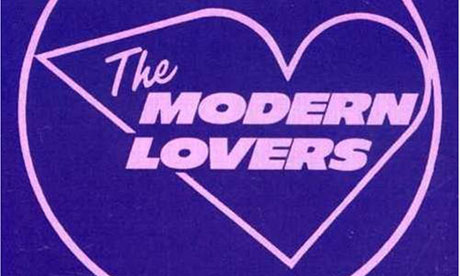
It starts with the name: the Modern Lovers. I can't think of a more perfect name for a band: if rock'n'roll was about romance and the forward motion of popular culture, that name captured the promise of the music in as economical a form possible. It continues with the cover: no glossy photo, or Storm Thorgerson faux-profundity, just a logo that looks like the commercial signage you see flashing past as you drive through the strip developments of suburban America. But the only album ever released by the Modern Lovers – and it's not even really an album, just a collection of 1972 demos released in 1976, long after the band had broken up – rests on the songs of Jonathan Richman.
As a teenager, Richman had been obsessed with the Velvet Underground and the Stooges. He hung out with the Velvets when they played in Boston; he went to visit them in New York. The jet roar of the Modern Lovers, with organ and electric guitar combining into an unsubtle but brutally propulsive unit, owed everything to the Velvets of Sister Ray and What Goes On, but with one crucial difference. Where Lou Reed and Iggy Pop were interested in darkness, Richman preferred the light.
Drugs, negation and the counterculture held no appeal for this suburban kid, who would patrol Boston Common with his guitar declaiming how much he hated hippies, these solipsistic know-nothings who preferred to muddy their senses than engage with the world around them. Of course, there weren't that many musicians in early-70s Boston with the same sensibility, so Richman would even attack his Modern Lovers bandmates in song: in a 1971 live version of the anti-hippie ballad I'm Straight ("If these guys, if they're really so great, tell me/ Why can't they at least take this place and take it straight?"), Richman names his guitarist Ernie Brooks as "Hippie Ernie … that Woodstock brain, that acid face". On the studio version, John Felice played guitar, and so the target of the song was Hippie Johnny, "he's always stoned; he's never straight".
I first bought The Modern Lovers (yes, I've bought several versions) in my mid-teens. Like the narrator of the songs, I was not having sex, not taking drugs, prone to an over-romanticised view of love, but absolutely besotted with the kind of unfettered guitar music that was only made by people who did seem to be taking lots of drugs and having lots of sex. It was little wonder it resonated, and Richman's contempt for his enemies spoke to my equally reductionist view of the world.
It helped that it was funny, too. Richman pointed up the ludicrousness of his proto straight-edge stance, and allowed his listeners to laugh at him and his unsuitable crushes on druggy girls. She Cracked contrasted his behaviour with that of the object of his affection: "She'd eat shit, eat garbage, get stoned/ I stay alone, eat health food at home." Like Scott Pilgrim, he would cast himself as the nerd unafraid to fight for love: "Picture this: I'm walking with my girlfriend/ 28 misguided souls walk by and say, 'We're moving in'/ There's a certain kind of girl that you care about so much/ You say: 'I don't care what you guys do to me, but her, don't touch!'" An amazing recording of that song, Someone I Care About, captures the Modern Lovers opening for the New York Dolls at the Mercer Arts Center in New York on New Year's Eve 1972, and Richman telling the Dolls' crowd of freaks and addicts that the Modern Lovers have come down from Boston to New York and they do not just want a girl to hang around with, they do not just want a girl to ball. That message, to that crowd: that's confrontational.
Somehow, these songs mean even more to me now, at 42, than they did when I was 16. Back then, life didn't really require much in the way of compromise. Deciding not to have a girl solely to ball was an easy decision to make when none of them are interested in balling. But adult life, of course, is a series of compromises and negotations, and I find the moral insistence of these songs to be wholly admirable, if unworldly. And despite the unworldliness, they're a still a far closer reflection of my life than Lou Reed singing about Heroin or Iggy wanting to be your dog.
Even more attractive than the moral centre of The Modern Lovers though, is the simplest thing about Richman's view of the world: the insistence that beauty is to be found in the quotidian, that though the 50s apartment block looks bleak in the 70s sun, you can still love the 50s and still love the old world. That there is no greater thrill than driving a suburban ring road at night, with the radio on, and it's worth getting out of the car to walk past the Stop'n'Shop to see if it can possibly be as good as driving past the Stop'n'Shop with the radio on. That song, of course, is Roadrunner, the song that remains more closely associated with Richman than any other, despite the fact it's been years since he played it, but whose power remains undimmed by the passing years. And that's because of the common experience therein: anyone who's been alone in their car at night, the windows down and the music on, knows exactly what he's singing about.
• You can write your own review of The Modern Lovers on our brand new album pages: once you're signed into the Guardian website, visit the album's dedicated page.
Or you could simply star rate it, or add it to one of your album lists. There are more than 3m new pages for you to explore as well as 600,000-plus artists' pages – so if, for example, the Velvets are more your thing, or the Stooges or the New York Dolls, then head there, find that act's albums and get to work ...







